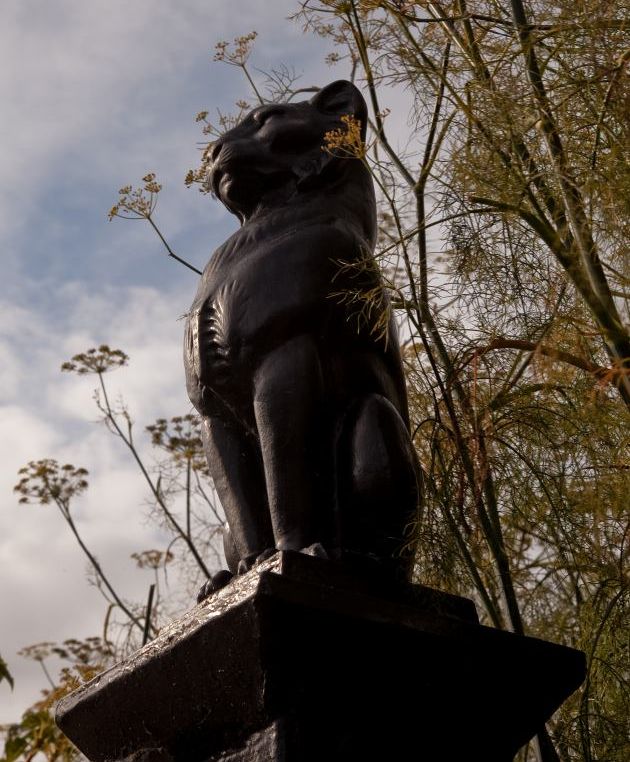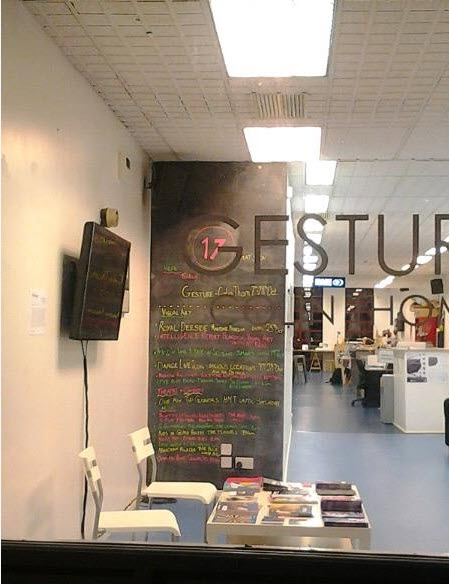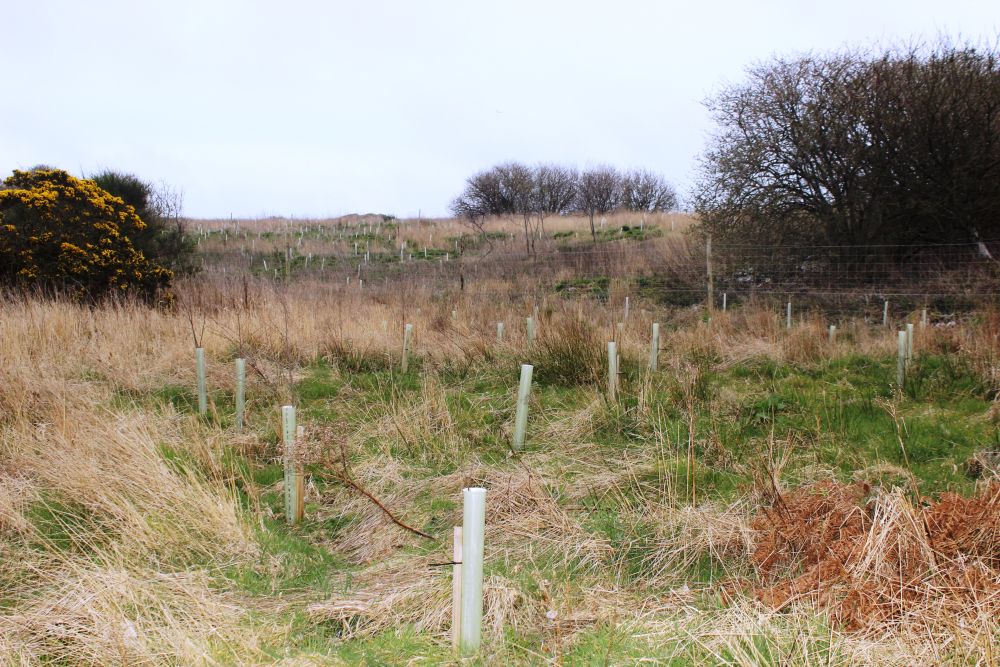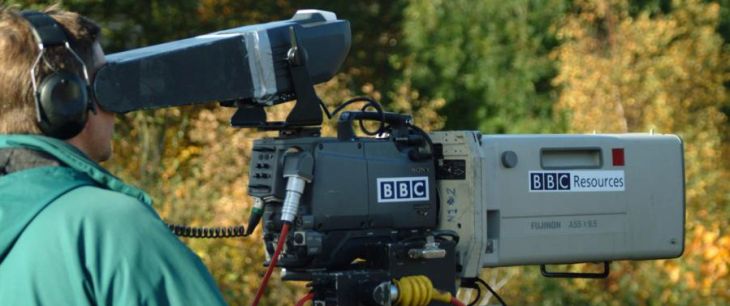One hundred columns ago, Old Susannah wrote on the theme of how propaganda permeates our media and government, and how it’s used by the powerful to steer us and to blinker us. Times haven’t changed. By Suzanne Kelly
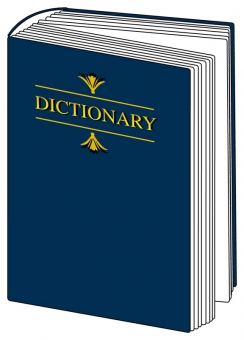 It’s been a confusing week in the Deen; it’s been very hard to read the signs. Not least the signs pointing the way to the tourist board. An eagle-eyed local restaurateur (and pal) Steve Bothwell noticed that signs near the green point people in the wrong directions; those who wanted tourist info are merrily sent the wrong way.
It’s been a confusing week in the Deen; it’s been very hard to read the signs. Not least the signs pointing the way to the tourist board. An eagle-eyed local restaurateur (and pal) Steve Bothwell noticed that signs near the green point people in the wrong directions; those who wanted tourist info are merrily sent the wrong way.
If only we had some way to fix this problem. Word is those responsible for this error are planning to solve the problem by having the tourist board moved to a location near where the sign points.
All things considered, I think we’re on our way to being a modern, major Scottish city like Edinburgh. We may still be able to escalate the St Nicholas House/Muse plans into our own Holyrood.
Holyrood of course was a well defined, precisely-run, on budget project which created the lovely building which fits so beautifully into the existing architecture of Edinburgh. If the building leaks, creaks and looks like its facade was drawn badly on the back of an envelope by someone using their foot and a crayon that just means it’s adventurous.
Perhaps we’ll yet have our own Tram scheme; we did have a councillor in the last administration calling for a monorail. Again Edinburgh handled that wonderfully well.
But as we learned this week, Edinburgh’s taken property management to a whole new level this week. Mandarins in the council managed to sell the historic Parliament building: the only problem was that it didn’t actually own it – Edinburgh’s citizens do.
Or should I say Edinburgh’s citizens did own it. Scottish property ownership expert Andy Wightman’s account of this imaginative sale can be found here. Aberdeen readers may be interested to know that the property in question was considered common good. At least you wouldn’t find anyone around the Granite City trying to appropriate common good land, Wood you?
Back here in the Glass City – sorry – Granite City, the Lord Provost decided that a motion to stop the Muse project was ‘incompetent’. It’s good to know the city is continuing to stop incompetence wherever and whenever they find it. Perhaps they want a word with the people who put up the tourist board sign though.
If only there was some way for the city to see whether or not people wanted a glass box or green space. Perhaps if a few hundred people protested, lobbied and campaigned. STV has a little poll going on; and while it’s a close-run thing, about 90% of people don’t want Muse’s glass box building.
Some people felt they were slightly misled over what would and wouldn’t happen to the St Nick’s site. While it’s not like a politician to ever mislead anyone, perhaps a few propaganda-related definitions may remind us that once in a blue moon, we should question the information put before us. And with that, a few definitions.
Emotive: (English adjective) Condition of having feelings and impulses not associated with logic or fact.
One thing we can’t have is people with feelings getting in the way of those who don’t have any. The favoured propaganda tactic to quash these Emos is to call them names, even if this paradoxically implies that those doing the name-calling are being aggressive, bullying and abrasive. This is a strategy beloved of the SNH for those of us who want to find means to manage our environment without killing animals unnecessarily.
The Scotsman’s headline set the tone last week, portraying the people and organisations opposed to deer culling as ‘angry’. You see, if you’re angry – you’re emotional. A good headline should set the tone of the article to come.
I hope no one will be embarrassed by how emotive I got in commenting on this Scotsman article, but here is a comment I made:
“It’s disappointing that so many of the comments on this page have to sink to insulting those who oppose the cull. I’ve been studying for some years now the draconian proposals and guidelines that SNH have created about deer populations. You could be forgiven for thinking that the latest SNH guidelines were written by the pro-hunting lobby. In Aberdeen, a hill which supported a few dozen deer for decades with meadowland and gorse had no starvation issues.
“The roe deer live a short span, and foxes are well known predator as are man (we had five deer poached last year in the area I’m talking about – Tullos) and dogs. The SNH now says a herd size for this hill will be only 3 or 4 animals. The SNH don’t explain how this can be a healthy gene pool – how could they? Anyone who protests the punishing guidelines is, as comments on here show, insulted and denigrated.
“The fact is it is becoming a nice little earner to turn meadowland into forest; my city has spent at least £200,000 so far to transform Tullos – when several thousand residents signed a petition to leave the hill alone. In the mean time, SNH last counted 19 deer in the entire city green belt and urban fringe. We won’t have any deer left if the SNH’s position goes unchallenged.
“The people who manage private land may also be forced to kill more deer than they think is sensible. When there are humane ways to control deer numbers, why are we choosing culling as a first and only option? No it is not scientific and has no historic basis at least in my area.”
What caused this gushing show of emotion on my part? Here are some of the rational, measured comments made on the article by pro deer culling people:
“The animal rights groups made a big fuss about “game management” claiming that it was cruel, akin to killing Bambi…sound familiar? Now the deer have over-populated and are starting to starve to death. It pays to listen to the experts who know what they are doing and disregard the sappy tree huggers.”
“These animal charities are notorious for attracting vicious and malevolent people, and so I hope the people of Perthshire will keep an extra-careful eye on them.”
and
“We can thank these so called animal rights nutters for releasing Mink into the wild and all the damage they have done to our natural wild life…. These campaigners should be prosecuted for promoting animal cruelty, because as has been said by many others below, the deer population is out of control and many die slowly of starvation and disease…..”
Well, that’s me told. Heaven forbid the pro-culling posts were orchestrated or that people who hid behind pseudonyms were part of the authorities trying to convince the rest of us that if you’re against deer culls you’re being emotional. Heaven also forbid that the SNH had issued any press releases that fed into the line the Scotsman chose to take. That would never happen.
Being emotional is of course a major failing in a person in this day and age; if you do somehow have any emotions left after the constant bombardment we’re subject to of violence, racism, misogyny, animal abuse, best keep those emotions hidden. You see, if you have any emotional reaction to something, then this means you are incapable of exercising any logic or intelligence. The two can’t be separated. Therefore, if you are against deer culling, you are unintelligent.
In this week’s papers we’re told that the subject of sentencing is also ‘emotive.’ You don’t say.
Happily, all sentencing in Scotland is proportional, measured, and no favouritism is ever shown to the powerful, the police, or the famous. I still fondly remember how a local policeman was cleared of looking up info on his ex regarding a drug case. The court found someone else must have accessed the data – using the accused’s password.
No doubt the police are looking for the real culprit – someone else in the force with the accused’s password who would have wanted info on the accused’s ex. Makes sense to me.
Not only is sentencing emotive, it can also be complicated. I’m as amazed as you are. Happily, the government is setting up yet another board, and no doubt sentencing, which the likes of you and I can’t hope to understand of course, will be handled just as fairly in the future as it is now.
The Government in fact is committed to making justice ‘FAIR, FAST AND FLEXIBLE JUSTICE‘.
Well, it can be fast. It certainly is flexible. I guess two out of three ain’t bad.
Misinformation:
How do you get your own way in politics? As is the case here in Aberdeen, by persuasion with facts and reason. However, on the rare occasion the public need to be guided just that little bit more.
Back when the new St Nick’s proposal was first launched at the city’s art gallery (itself soon to be closed for a few years for a tasteful destruction of its marble stair and for a portacabin tm to be plunked on top of it), a consultation was held. It was wonderful to see the pretty drawings. Obviously though, the details were meant to be left to the architects of this city’s current architecture – our planners and those with big chequebooks.
With the people we have controlling the master (?) plan, many of whom have important titles like ‘Dr’ and so on, we’ll be the rival of Washington DC, Paris and London in just a few more years. If not, we may wind up twinned with Milton Keynes or Redditch. Anyway, I wrote to the city with my (emotive) criticisms of the scheme. In due course, I was invited to give a 5 minute deputation to the full council (Result!) on what I thought was wrong with the scheme.
A whole 5 minutes – and all I had to do was spend the entire day off work hanging around in the Town House.
I wondered – Should I take a day off work, buy a new frock, get a Valerie Watt spray tan and have my nails done and come and make a speech for 5 minutes? No doubt concerns of traffic congestion, pollution, architectural concerns, etc. would have won the day.
I called someone at the council and we discussed the pros and cons of this deputation. The word on the street as it were was that the decision to build glass boxes on the former St Nicholas House site was metaphorically set in stone. I could come along, but in the view of my contact, it would not make a difference. I don’t want to get my source in trouble; like me, they had been told it was too late to make any change.
We both believed this to be true. So I declined my chance to bring up a few emotive issues about St Nick’s former site.
Fast forward a few months, and it seems both my source and I were misinformed. The city won’t lose a hundred million pounds if we say no to the current design.
The future of the site has seen one or two little changes since that consultation at the art gallery. Today the story is that we’re getting that glass office after all. Somehow this will revitalise our retail sector, cure baldness, and make billions of jobs. I wonder what the story will be tomorrow.
Yellow Journalism: (org. USA – compound noun) Sensationalising or fabricating stories in order to both sell newspapers and to influence opinions.
This term hardly matters in today’s modern, well-informed age, but just for historical interest, here’s a word on yellow journalism. In days gone by newspaper giants Hearst and Pulitzer were fighting for supremacy in the US market, there was the occasional bit of creative licence taken with the facts. A fight for a cartoon strip featuring ‘the yellow’ kid – a very popular feature – lent its name to a kind of journalism where facts don’t get in the way of a story, where hatred can be inflamed to influence opinion, and where the powerful are pulling the strings, often distracting people from the truth by the use of sensationalism, propaganda and misinformation. This was the time of American expansionism, and a few little wars here and there. Isn’t it great to be in the enlightened age?
As described on one website:
“The rise of yellow journalism helped to create a climate conducive to the outbreak of international conflict and the expansion of U.S. influence overseas, but it did not by itself cause the war.
“In spite of Hearst’s often quoted statement—“You furnish the pictures, I’ll provide the war!”—other factors played a greater role in leading to the outbreak of war. The papers did not create anti-Spanish sentiments out of thin air, nor did the publishers fabricate the events to which the U.S. public and politicians reacted so strongly.”
Of course, a newspaper editor has several responsibilities to balance. One – to make lots of dosh for the shareholders. Two – to take lots of dosh for the sponsors and advertisers, who must be kept happy at all costs. Three – to make people buy the newspaper in the first place. It’s a tough job.
Remember the giant Evening Express headlines about ‘packets of white powder’ being found on an offshore oil installation? The implication was it was illegal drugs, and the paper milked it for all it was worth. Alas! it was only cold medicine. You’ll remember the paper’s headlines announcing it had made a mistake. Or perhaps not.
Some papers such as the Daily Mail are subject to similar creative embellishments. Emotive headlines are a great way to get facts across to us emotive, slow-witted people, especially about immigrants, benefit scroungers, foreigners and other kinds of undesirables. It’s also a good way to sell papers.
News Blackout: (modern English compound noun) To deliberately withhold news and information.
If they don’t know about it, they can’t be upset about it. Whether it’s the P&J veritably ignoring stories about Donald Trump having underworld links, sometimes it’s best to have a media blackout. We’ve all those hoards of incoming tourists to think about, and Sarah Malone needs a new pair of Choos. Best a newspaper editor is selective with what stories they print.
That’s the case these days at London-based news institution The Telegraph.
The paper is just a little on the conservative side, and its rational, balanced, live-and-let live owners, the Barclay Brothers, have been doing a great job of livening things up.
Once the paper of choice for Tories it’s far more inclusive now, with stories about women with three breasts (that wasn’t quite true). Any story about business profits, exam results, you name it is usually dressed up with a picture of a pretty girl – and of course all the guys like their news served up like that. Private Eye magazine has cruelly made fun of the paper’s use of ‘fruity’ girls, and accuses the Torygraph (as PE calls it) of ‘dumbing down’.
It’s not really dumbing down if you decide not to trouble your readership with stories that are either boring or complicated (which is pretty much the same thing). Take for instance the stories circulating about HSBC (‘the world’s local bank’) being somewhat in a pickle, the Telegraph decided that it wasn’t much of a story. So there are some questions about the bank’s operations, a wee black hole in its books and its Swiss offices being raided by police and the like.
HSBC has also apparently helped wealthy people avoid paying tax – that’s hardly news is it? While the rest of the UK’s papers were covering this story, the Torygraph was ignoring it. It’s almost as if the Barclay Bros had rich, powerful interest to protect – but surely not.
I’m certainly not suggesting that the government, quangos, media, police and our local politicians are manipulative, self-serving, devious or dishonest – heaven forbid. But I am beginning to have my doubts.
Next week- an updated who’s who of the great and powerful of city and shire.
- Comments enabled – see comments box below. Note, all comments will be moderated.
[Aberdeen Voice accepts and welcomes contributions from all sides/angles pertaining to any issue. Views and opinions expressed in any article are entirely those of the writer/contributor, and inclusion in our publication does not constitute support or endorsement of these by Aberdeen Voice as an organisation or any of its team members.]

